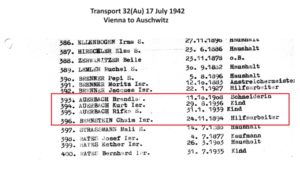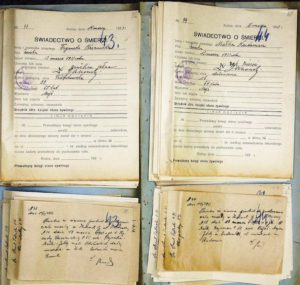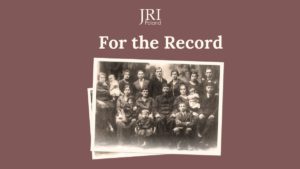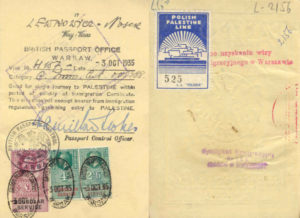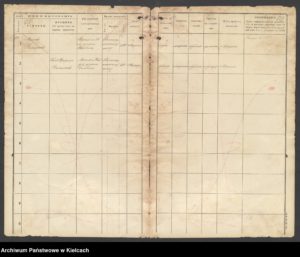Repairing the Past: A Mystery Solved and a Family Reunited Through Genealogy
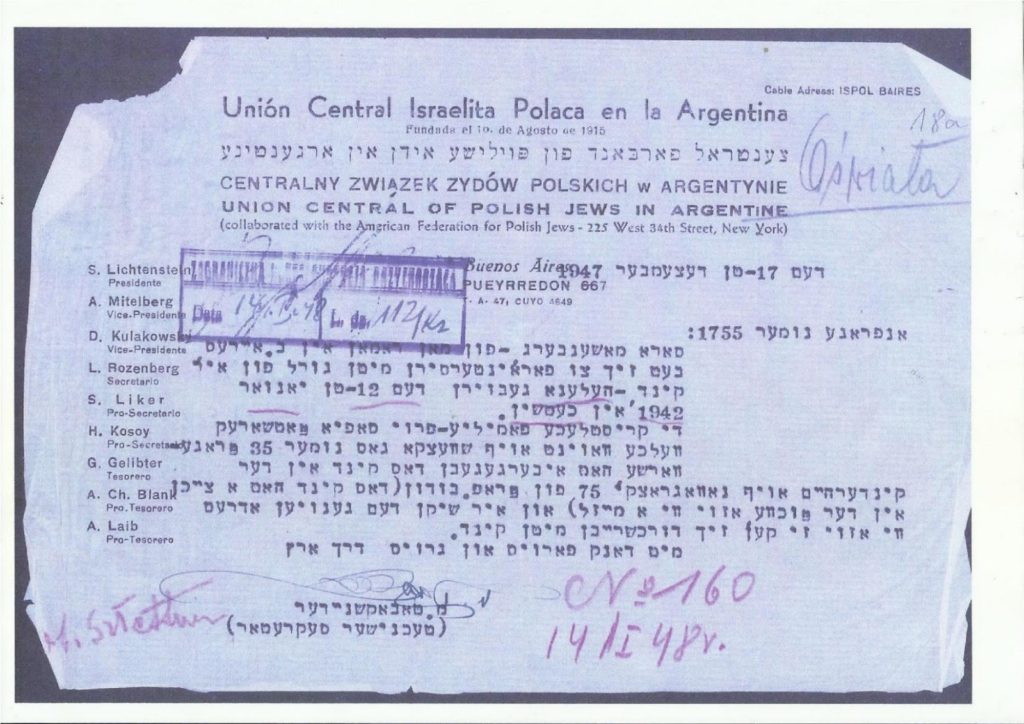
Amid war, tragedy, memory loss, name changes, fragmented documentation, DNA—and even a birthmark—Michael Tobias, one of JRI-Poland’s founders, helped reconstruct the extended family of a Polish Holocaust (Shoah) survivor named Zuzanna. This research resulted in locating and reconnecting her with family across four continents after more than 80 years of separation. The following epic story shows how great detective work and JRI-Poland’s access to Polish records can make a difference. It also proves that even when we think we are alone – we may not be…
Leon Roman and Sara Roman (née Moszenberg) were a married Polish Jewish couple who had been somehow separated during the Shoah. Not knowing that they and their child had all survived, they each started new families after the war. Their daughter, now known as Zuzanna, had in fact been adopted by a Polish Catholic couple and raised unaware of her Jewish heritage. Zuzanna’s adoptive father was contacted years after the war and bribed an orphanage staff member to say Zuzanna had perished. This series of unfortunate events eventually led to Michael Tobias helping Zuzanna discover that she was not alone but had cousins and two possible half-siblings: one from her mother’s second family, and another from her father’s second family.
Leon Roman’s birth record, found through the JRI-Poland database, provided the clue as well as the proof that Leon had indeed survived the Shoah.
Leon Roman’s 1916 birth registration, amended in 1949 and again in 1954
(Source: Jewish Records Indexing – Poland)
Leon was the son of Abram (Adam) Roman and Leja (Leokadia) Biber. Leon had at least two siblings, Feliks – who later changed his surname to “Grotte” – and Rita who perished at Auschwitz along with their parents. Adam and Leokadia Roman were Zuzanna’s paternal grandparents.
Zuzanna: The Orphan Who Survived
Born on 12 January 1942 in Chęciny to Leon Roman and Sara Moszenberg, Zuzanna was caught in the chaos and terror of Nazi-occupied Poland. How Zuzanna ended up in an orphanage is not 100% clear. Zuzanna’s paternal uncle, Feliks Roman (later known as Josef Grotte), claimed that he smuggled Zuzanna from the Chęciny Ghetto to an orphanage in Warsaw, hoping to save her from certain death. Zuzanna later discovered that a young woman carrying her found refuge in Warsaw one evening with a non-Jewish Polish woman just before the Nazi curfew. The woman entrusted Zuzanna to Mrs. Paciorek, who then handed her over to the police, who then placed her in the Father Baudouin Orphanage run by Catholic nuns on 22 December 1942. Zuzanna had a note in her clothing saying ‘Helena, baptised’ and her date of birth. Feliks Roman might have helped Zuzanna’s escape from Chęciny before or at the liquidation of the ghetto there in September 1942, but it seems likely the story of Mrs. Paciorek’s involvement is accurate.
After the War, the family members who looked for Zuzanna were told that all the children in the orphanage had tragically perished during the Warsaw Uprising.
Decades passed. Then, after 80 years, through DNA testing and the efforts of researchers John Durkan, Paddy Waldron and Michael Tobias, Zuzanna uncovered the truth. Zuzanna’s DNA showed that her parents had been Jewish. She contacted the Emmanuel Ringelblum Jewish Historical Institute of Warsaw and discovered that in 1947 a Sara Moszenberg (Roman) from Buenos Aires had written searching for her daughter Helena, born 12 January 1942 in Chęciny and left in the Father Baudouin Orphanage in Warsaw via a woman called Mrs. Paciorek. Zuzanna began to piece together her real identity, learning not only about her parents’ survival but also about possible half-siblings she never knew she had.
17.12.1947 Case no. 1755: Sara Moszenberg, married to Roman, in Buenos Aires, asks about the fate of her child Helena, born 12 January 1942 in Chęciny. The Christian woman, Mrs Zofia Paciorek, who lives at 35 Szwedzka Street, Praga, Warszawa, handed the child to the Baudouin Children’s Home at 75 Nowogrodzka Street. (The child has a birthmark on her groin, resembling a mouse). She requests that the exact address be sent to her so she can write to the child. With thanks and respect, M. Tabaksznajder, Technical Secretary.
Zuzanna’s Father’s Second Family: A New Beginning in Australia
Meanwhile, Zuzanna’s father, Leon Roman, survived the War and eventually met and married Danuta Szwarcbaum, herself a Holocaust survivor from Będzin, Poland. Danuta had been married before to Josef Buchmayer with whom she had a daughter, Lucyna (Lucy, Yiddish name Cyrla), born in 1942. When the family was forced into the Sosnowiec Ghetto, Lucy became one of the last Jewish babies officially recorded there.
Cyrla Sara (=Lucy) BUCHMAJER birth Sosnowiec 9 November 1942. German Civil Authority.
(source, Jewish Records Indexing – Poland)
As the Nazis began targeting children in the Sosnowiec Ghetto, Danuta’s sister-in-law, using insider knowledge, orchestrated a daring rescue. Lucy, just 10 months old, was smuggled out in a garbage truck and adopted by friends of Danuta, a Polish Catholic couple, Bogda and Janus, who could not have children of their own. Josef Buchmayer perished in the camps, along with Danuta’s sisters and one brother. Danuta herself escaped from a deportation train, aided by a German guard who was taken by her appearance. Bogda and Janus came to Danuta’s rescue, supplying her with “Aryan” papers.
After the War, Danuta returned to Sosnowiec to search for Lucy. Leon supported her in this mission. Despite some resistance from Lucy’s adoptive parents who loved her dearly, Danuta won a legal battle to reclaim her daughter. The two families remained on friendly terms, however and Bogda and Janus were recognized as Righteous among the Nations by Yad Vashem in 1985.
Leon and Danuta married in Wrocław on 27 April 1949. The family relocated to Germany and later emigrated to Australia. Lucy grew up believing Leon was her biological father, only learning the truth at the age of 20. Her daughter, Rita, discovered as a teenager that Leon was not her biological grandfather but nevertheless maintained a deep bond with him, describing him as a kind and loving figure who played a central role in her life. Leon passed away in Sydney in 2008. Sadly, Lucy struggled with the psychological scars of early abandonment and trauma. Despite this, she remained a deeply sensitive and intelligent woman. She passed away in 2023, before this family story was brought to light.
Zuzanna’s Mother’s Second Family: Life in South America:
Zuzanna’s mother, Sara Moszenberg, was imprisoned and abused in Majdanek from which she escaped in May 1944. She was told that her husband Leon had been murdered in Treblinka. She met Moshe Bruh who was also married with children, but his family had all been murdered in the Shoah. After long hardships, they arrived together in Italy, where they married and where their only son, Enrico (later called “Zvi”) was born.
After about two months, Moshe and Sara separated and Sara immigrated to Brazil with Enrico, while Moshe went to Argentina. Five months later Sara and Enrico travelled to Argentina, where Moshe took Enrico and prevented his mother Sara from raising him.
After a few years, Moshe passed away leaving Enrico to be raised by his uncles. When he was 17 years old, Enrico made Aliyah (immigrated to Israel) – where he changed his name to “Zvi”. Zvi had grown up believing his mother had rejected him. In truth, Sara had tried to raise him but was forcibly separated and denied further contact. The image of an abandoning mother slowly gave way to the portrait of a woman silenced by circumstance—not indifference. However, Sara passed away in São Paolo, Brazil on 27 February 1987 without her children, whom she had dearly wanted.
Zuzanna’s Search: Uncovering the Threads:
Zuzanna began her search for her roots in 2022. With many dead ends and little information, the journey was painstaking. Assistance from genealogist Michael Tobias in early 2025 proved crucial. Over a period of 4 weeks he located records for the family in the Jewish Records Indexing – Poland database (https://jri-poland.org) and verified that details in existing Holocaust records at the International Tracing Service (via the Wiener Library https://wienerholocaustlibrary.org) and the United States Holocaust Memorial Museum (https://www.ushmm.org) wrongly stated that both Leon and Zuzanna had perished.
Through extensive research, it became clear that both Leon and Sara had survived, remarried, and had additional children. Zuzanna’s daughter Justyna and granddaughter Kasia reached out to various individuals, including Rita in Australia (who had been located by Michael) and Zvi in Israel (who had been located by Justyna’s brother-in-law John Durkan). Emails began to flow. The fog of the past began to lift.
Rita, moved by the uncanny parallels between her mother Lucy and Zuzanna—both babies born during the war, both hidden, both adopted by non-Jewish families—shared deeply personal memories and stories about Leon. Her heartfelt messages spoke of Leon’s warmth, humility, and enduring love for family. She felt Leon’s presence and that Zuzanna was indeed his daughter.
Eventually, contact was made with Zvi in Israel, now almost 80 years of age. Zvi agreed to take a DNA test with MyHeritage.com and on 2 June 2025 the results arrived that proved beyond doubt that Zvi and Zuzanna are indeed half-siblings. Plans are underway for Zvi to visit Poland and walk the streets of Małogoszcz, the birthplace of his lost mother, accompanied by the half-sister he never knew before. The meeting has been arranged for 22 August 2025.
The research objective then shifted to locating Zuzanna’s first cousin, Adam Grotte, the nephew of her father Leon whose brother had changed the family name from Roman to Grotte. Eventually contact was made via cousins in Australia, and it transpired that Adam, with no knowledge of Zuzanna, uncannily had plans to visit Poland on 22 August 2025.
* * * * *
Zuzanna is no longer alone.
For Michael this has been another emotional journey. It seems to him that Fate played a part in his involvement. One of the branches of his own family lived in both Chęciny and Małogoszcz and he has visited both towns several times. He has now discovered that he is remotely connected through marriage to both Sara Moszenberg and Leon Roman and hence to Zuzanna whose family had contacted him for help.
The reconnection of this family is a living testament to the resilience of Holocaust survivors and the importance of truth, documentation, and remembrance.
May their story be told and remembered.
May we continue to care for one another by looking into the past.
Yasher Koyach, Michael and friends.
